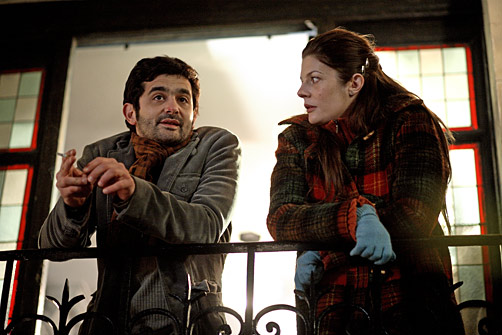
I don’t mean to be hard on the film — In fact, I mostly enjoyed it. It’s textured and novelistic and relatively engaging, if a little long at two and a half hours. But it’s also very much the kind of story that moves a certain type of film snob — I’m looking at you, Andrew O’Hehir — to overpraise, usually exclaiming something along the lines of “Finally, a film about ‘real people’ rather than costumed superfreaks!” (See also David Edelstein on (the very good) Man on Wire for this tendency at its most innocuous, or David Denby on the last Matrix for it at its worst.)
Now, I don’t really see the two as mutually exclusive — there’re enough films to go around — and I’d like to think I enjoy both. (Would The Wrestler have been better with outer-space werewolves? I doubt it. Ok, well, maybe.) Nevertheless, while I was entertained by the film, Christmas set off my “Emperor’s New Clothes'” pretentiousness-detector relatively early in its run (It’s been finely honed over my time in grad school.) Call me a Berkman-style philistine if you will, but 140 minutes of watching the Vuillards — the clan of this particular christmas carol — wrestle with their family traumas over wine and jazz standards, often in not-quite-believable fashion, was just about enough for me.
After a father’s speech over a gravesite, A Christmas Tale begins with a sad fairy tale of sorts. (It’s told with puppet silhouettes, as per Henry Selick or Amelie.) Abel (Jean-Paul Roussillon, marrying up) and Junon (Catherine Deneuve, still a beauty) had two children, Joseph and Elizabeth. But Joseph, it soon turns out, suffers from a disease of the bone marrow, and neither his parents nor Elizabeth are compatible with him. So, the couple has another child, Henri, but he too cannot save Joseph, and the Vuillards’ first-born perishes. A fourth child, Ivan, comes later, but the original sin of the family is set: Henri could not save his older brother’s life, and thus, for all intent and purposes, he was born a failure.
In the modern-day, Elizabeth (Anne Consigny, the nurse of Diving Bell and the Butterfly) has grown into a melancholy playwright with a distant husband and a schizophrenic son (Emile Berline). Her brother Henri (Mathieu Almaric, also of Diving Bell) is basically a screw-up, living down to everyone’s expectations of him enough that Elizabeth eventually banishes him from her presence. Ivan, the youngest (Melvil Poupaud), is the charismatic peace-maker of the family, who hopes to bring his siblings together again. (But he has his own domestic problem, of which he is dimly aware: a potential love-triangle involving his wife (Chiara Mastroianni, looking frighteningly like her famous father and playing the daughter-in-law of her mother) and his cousin (Laurent Capelluto).) Into this fractured family dynamic, a bombshell is dropped — Junon, the matriarch, is diagnosed with the same fatal cancer that felled Joseph years earlier. And this time, irony of ironies, the only compatible relatives for a life-prolonging bone marrow transplant are Elizabeth’s son…and Henri the exile. Who’s got the hand now, big sister?
This story, along with several other strands of interaction, slowly develops over the Christmas week, as all the various wings of the Vuillards get cooped up together, back in the nest. To its credit, A Christmas Tale doesn’t push on these narratives, but lets them unfold organically over the course of the movie. In fact, the film isn’t really plot-driven at all — It moves languidly to the rhythm of conversation, and there are a number of clever or resonant ideas buried therein. The transplant on everyone’s mind works as a great metaphor for the whole enterprise — Junon’s body could very well reject Henri’s marrow, i.e. the gift of family could well kill her, which is very far from the notion of family as an unadulterated joy that you might find in your average holiday film. (Indeed, mother and son have a grand ole time continually expressing their (feigned) indifference toward one another, although that’s clearly mostly for show.)
Still, as the movie progresses, and the same underlying tensions simmer to near-boil over and over again, and the big issues (mortality, infidelity) get shrugged off while small ones turn into battles of bon mots or even fistfights, I began to feel quite a bit like Henri’s girlfriend-along-for-the-ride (Emmanuel Devos), who checks out of the proceedings well before the jig is up. That sure is a great family you have there, Msr. and Mme. Vuillard. Happy holidays, good luck with the transplant, and bon soir. I’m sure y’all will have a swell time with the ritualistic airing of grievances without me.


You know, just about anything is better with outer-space werewolves. I wonder if I can sneak a couple into my dissertation.
Go for it! Just make sure you refer to them as “feral interpolations of the Other” or “archetypally primitivist readings of the alien” or something.